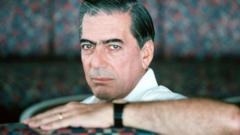Vargas Llosa's unapologetic perspective on authority and social injustice resonated through his vast body of work, solidifying his status as one of the last giants of the Latin American Boom.
The Legacy of Mario Vargas Llosa: A Controversial Titan of Literature

The Legacy of Mario Vargas Llosa: A Controversial Titan of Literature
Mario Vargas Llosa, the celebrated Peruvian novelist, has passed away at 89, leaving behind a multifaceted legacy in Latin American literature.
Mario Vargas Llosa, the renowned Peruvian author, has died at the age of 89, leaving an indelible mark on the landscape of Latin American literature. His journey from a middle-class background in Arequipa, Peru, to becoming a Nobel Prize laureate in 2010 is a testament to his influence and prowess as a storyteller.
Throughout his prolific career, which spanned decades and produced over 50 works, Vargas Llosa was often unafraid to tackle contentious topics such as authoritarianism, violence, and machismo. His early works, including "The Time of the Hero" (1962) and "The Green House" (1966), played pivotal roles in igniting the Latin American Boom—a literary phenomenon characterized by innovative storytelling that drew global attention to the complexities of life in the region.
Despite initially aligning with leftist ideologies, Vargas Llosa's stance shifted dramatically over time, culminating in a surreal moment where he unsuccessfully ran for the presidency of Peru as a center-right candidate in 1990. This political journey reflects the evolving nature of his outlook on both literature and society. He articulated his disillusionment with revolutionary movements, particularly through notable experiences such as the "Padilla Affair," which deeply impacted his relationship with Fidel Castro.
Vargas Llosa's enduring legacy is further marked by his complex relationships with fellow writers, the most significant being his rivalry and eventual reconciliation with Colombian novelist Gabriel García Márquez. Their infamous feud, sparked by a physical altercation in 1976, underscored the deep personal and ideological divides that can exist within the literary community. Their public disagreements served as a microcosm of broader societal conflicts, highlighting the intersection of literature and politics in Latin America.
His works, from "Conversations in the Cathedral" to "The Feast of the Goat," continued to engage with the themes of state violence and personal integrity, often thrusting readers into the narratives of human suffering and resistance. His latter life was marked by continuing literary achievements and personal controversies, including his departure from his long-term marriage to embark on a relationship with socialite Isabel Preysler.
Mario Vargas Llosa's death marks a poignant moment for the literary world, signaling the end of an era characterized by bold storytelling and profound social critique. As the last significant figure of the Latin American Boom leaves us, his works continue to resonate, inviting future generations to reflect on the intersections of politics, culture, and literature in shaping Latin America's complex narrative.



















